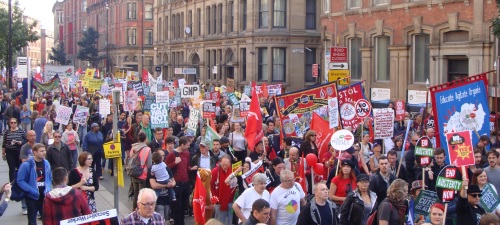 |
| Corbyn, seen here speaking at at CWU event in Manchester, rejected the idea of a multi-party progressive alliance at the final Labour Leadership hustings in Glasgow. |
The stalemate in Spanish politics, unbroken now by two elections and very much looking like leading to a third election in the space of a year (Jones, 2016), is the most obvious symptom of a divided society. But Spain is hardly alone in that.
Recent elections in the UK have shown British politics heading the same direction. The two traditional big tents are losing their grip and people are looking for other options. As a result, the broad social cross-sections needed to hold majority power - even under a majoritarian two-party system like first-past-the-post - are becoming harder to build and control.
The questions is, what can be done to avoid such an impasse?
Contrary to the conventional wisdom, the surest path to stability is pluralism. But getting there requires rethinking what is meant by pluralism, away from the simplistic image of a fractured multi-party politics.
The tendency in the UK has been to portray plural systems, with their coalitions between multiple parties, as a system of never ending deal making - in contrast with the direct and little-trammelled power afforded to majority governments by the two-party system.
But that deeply simplistic picture ignores both the necessity for representation and the true building of consensus. Under the two-party system, politics is squeezed and distilled into narrow establishment and opposition positions - politics simplified into two parties locked into adversarial stances that drive a wedge through society.
That reduces politics to a polarised dynamic, with no space for nuance. Worse still, policy has become a professional art, the preserve of a narrow group of think tanks and party policy officers, that usually offers watered down versions of public campaigns - ostensibly to make them broadly palatable.
But trying to stretch a big tent over a broad membership, and expecting them to fall in line behind a professionally crafted policy platform, just alienates people from the responsibility to try to find consensus and imagine grounds for agreement.
It is politics made more efficient, but robbed of its essential character: as a public forum for critical debate on how to shape our common space, where representation and inclusion are the priority not minority voices competing to 'win' the right to direct everyone else from their own narrow perspective.
It is one of the more disappointing elements about the Labour Party that it has consistently failed to grasp this idea - even under the leadership of Jeremy Corbyn. Corbyn talks of re-engaging social movements, but fails to engage with pluralism, with multiplicity, rejecting particularly the prospect of a Progressive Alliance.
Even under democratic socialist leadership, the party is still presenting itself as the self-styled only option, where the ideas of the Left - even when including trade unions and social movements of various and diverse kinds - must still ultimately be filtered through one single political party, pitching for broad public consumption, to achieve political expression.
Even under democratic socialist leadership, the party is still presenting itself as the self-styled only option, where the ideas of the Left - even when including trade unions and social movements of various and diverse kinds - must still ultimately be filtered through one single political party, pitching for broad public consumption, to achieve political expression.
What a contrast that is to how Barcelona's radical democrats view their task. Barcelona En Comu, not so much a party as a civic alliance, also talk of rebuilding the civic representation aspect of politics, but they are demonstrating it in practice.
Their municipal government is built around an alliance of various movements and parties. They understand their task in the civic space, in the movements and in the squares, is to involve both their opponents and fellow travellers of different parties alongside their own supporters, if they are really going to build a system of political pluralism - representative and inclusive
If Catalunya, the wider Spain and Britain keep down the road of adversarial politics the only result there can ever be is a society where the majority feel disconnected and uninvolved with their own physical and social spaces.
Politics isn't about winning. Its about representation. A plural politics takes as its starting point ensuring that people are able to see their views represented - whether directly through assemblies or a little more indirectly through multiple parties.
The next step is to rethink how these groups then interact. Rather than adversaries, these groups then hold a responsibility to craft, through debate, discussion and, yes, compromise, their various policy themes into a coherent shape that reflects the particular, distinct and plural society from which they have sprung.
Only then can people begin to reconnect, both with politics and with their civic spaces. Consensus is key. Representation is key. Pluralism is not the beginning of division and instability, but the only path to a real and lasting stability.









